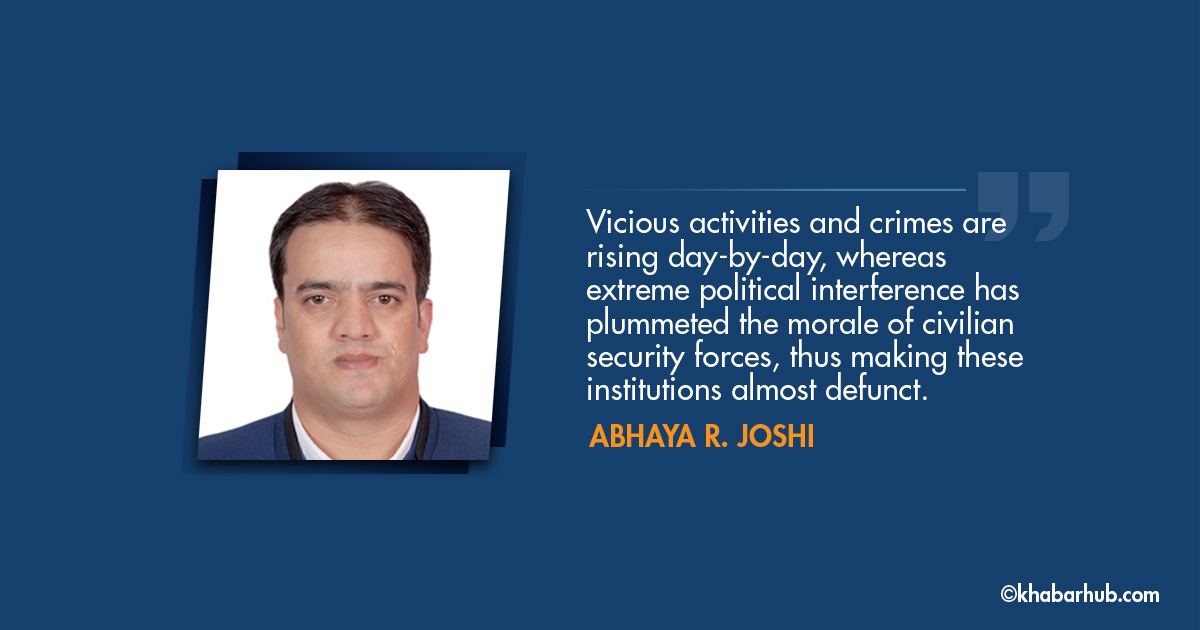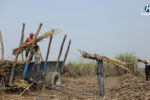Nepal’s political scenario has increasingly become uncertain in recent days. Given the current unfolding developments within the ruling party(ies), predicting the political future and the future of democratic governance in the country has been difficult since a couple of events of late has thrilled the contemporary political and security landscape.
Nepal Government and Biplav-led CPN group formally signed a “Peace Agreement” and it is sincerely hoped that the “peace process” will bring an end to the violent attacks on security forces, extortion campaign against businesses, planting of bombs in public and threats to the life and livelihood of citizens.
Under the aggrandized “Peace Agreement”, the government will lift imposed ban on the outfit, release all of their party members and supporters from jail and drop all legal cases against them, but in return, the Biplav-led CPN does not have to do anything but agree to carry political activities openly and peacefully.
Bringing a rebel group under a peace process is welcoming, but providing blanket amnesty to all of its members is against Nepal’s past practice and prevailing law of the land, as some of the members associated with Biplav-led CPN are being considered in the court of law under serious criminal charges.
The absence of due process, silence on the weapons in rebels’ possession, rapidly unfolding and divisive political scenario, and the impulsive announcement of the “Peace Agreement” has created doubt whether the agreement was a peace agreement or a shaming process recited in disguise to divert the attention away from the unfolding political crisis of the government.
Conspicuously, there is no provision included in the “agreement” to handover or neutralize the weapons in possession of the Biplap-led CPN.
Therefore, the government should minutely analyze possible consequences and security threats of releasing those once convicted cadres back into the society and observe how communities react, while remaining alert about the threats posed to the victims of these rebel who has entered the society openly to engage in their “peaceful” politics.
For sustainable peace and continuous ownership of the deal, the peace agreement with any rebel group should have the participation of major political parties and it should be based on broad political consensus.
Due process should be followed to make the agreement more transparent and acceptable to all concerned.
Management of the weapons and those using them should be carried out cautiously, in fact, whenever an armed group comes to a peace process, the first and foremost priority should be the agreement on the management of the arms and militia, followed by the non-state party handing over all their weapons to the party agreed thereto.
Until and unless all weapons are taken in secure and competent custody, there will always be security threats in the country.
Recently, another armed outfit called Janatantrik Terai Mukti Morcha (aka Goit faction) has resorted to violence and claimed responsibility for the bombing of 14th March at one of the crowded government offices in Siraha, injuring at least eight persons.
A Genuine peace agreement achieved through due process, following established national and international norms regarding truth, reconciliation and justice; brings lasting peace and broad ownership to that agreement.
How Nepal Government interprets that incident and the faction responsible for it is yet to be known. One shouldn’t place Biplav and Goit factions in the same basket to analyze their activities.
Despite the armed and violent campaign, the Biplav-led group has marched with a more definite objective and vision since the beginning, whereas the same is not known for the Goit-led group.
The absence of due process, silence on the weapons in rebels’ possession, rapidly unfolding and divisive political scenario, and the impulsive announcement of the “Peace Agreement” has created doubt whether the agreement was a peace agreement or a shaming process recited in disguise to divert the attention away from the unfolding political crisis of the government.
Whatever it may have been, it is certain to have emboldened some wrong elements of the country operating under the guise of politics and utilizing violent tactics.
While the government is busy saving its seat of power and negotiating “peace agreements”, our society has gradually turned antagonistic.
Violence is no one’s desire but peaceful protest is hardly heard by anybody. Vicious activities and crimes are rising day-by-day, whereas extreme political interference has plummeted the morale of civilian security forces, thus making these institutions almost defunct.
Every single decision whether it is day-to-day security operations or minor changes within these institutions or regular promotion, assignment, transfer, and postings; all are taken at the behest of and in the interest of political leaders.
The worrisome situation is how even the high-level security personnel have to work in cahoots with politicians and what they are compelled to do to prevent career hampering punishments or unnecessary transfers.
Civilian security forces and their chiefs have obligation to boost the morale of their organization members and act courageously to shield any undue political pressure.
This is just an example of how our civilian security agencies responsible for enforcement of the law, investigation of crimes and maintenance of peaceful order in the society are being miserable, demoralized and dysfunctional.
A Genuine peace agreement achieved through due process, following established national and international norms regarding truth, reconciliation and justice; brings lasting peace and broad ownership to that agreement.
However, it should not be a political gimmick to create a diversion and steer the conversation away from ongoing intra-party struggle taking place in governing party(ies).
Civilian security forces and their chiefs have obligation to boost the morale of their organization members and act courageously to shield any undue political pressure.
They may sometimes go against the will of the political leaders, however, without overstepping their authority vested by the governing law of the land.
Security governance is a delicate yet integrated process that works to benefit people and promote and protect the national security of the country.
Mr. Joshi is the Chairperson of Nepal Centre for Security Governance (NCSG), a Kathmandu-based think-tank. Twitter: @AbhayaRJoshi









Comment